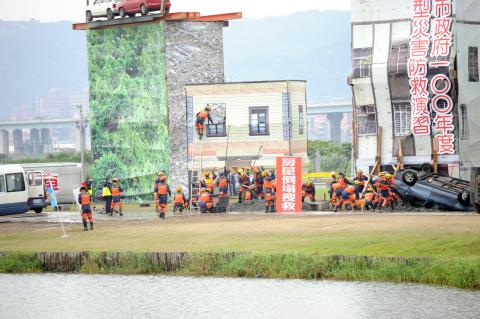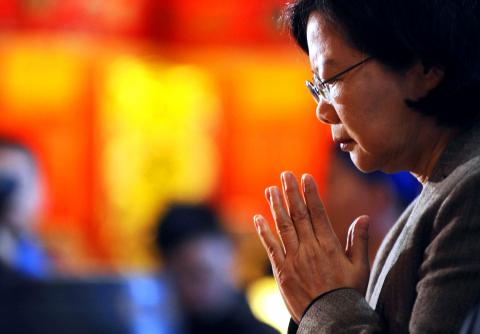Democratic Progressive Party (DPP) lawmakers yesterday rallied to presidential hopeful Tsai Ing-wen’s (蔡英文) defense after the Chinese Nationalist Party (KMT) attacked her plan to seek to draw down operations at the Fourth Nuclear Power Plant in Gongliao District (貢寮), New Taipei City (新北市), in favor of sustainable energy and other sources.
On Thursday, Tsai said if she were elected next year, she would seek to end operations at the power plant currently under construction as part of her plan to phase out nuclear energy by 2025. She also proposed decommissioning the three operational nuclear power plants between 2019 and 2025.
The shutdowns, she said, would be subject to conditions, including whether Taiwan could adequately replace the electricity produced by the plants with other power sources, such as by building renewable energy capacity and achieving better efficiency at coal-fired power plants.

Photo: Lo Pei-der, Taipei Times
At a hastily assembled press conference yesterday, Tsai said a report in the Chinese-language United Daily News had misrepresented her intentions, a key factor behind the KMT’s criticism, aides said.
“The United Daily News purposefully misrepresented [my comments],” Tsai said, adding that her plan was to spark discussion to ensure that operations at the plant do not start against the public’s wishes. The NT$273.5 billion (US$9.28 billion) project would still be completed, she said.
“Society should begin to examine now whether we should begin operations at the Fourth Nuclear Power Plant,” she said, adding that most opinion polls showed support for her approach.

Photo: CNA
In its attack, the KMT said Tsai should explain why she was promising to phase out nuclear energy when she failed to oppose the construction of the Fourth Nuclear Power Plant when the DPP was in power.
KMT Culture and Communication Commission Chairman Su Jun-pin (蘇俊賓) accused Tsai of manipulating the nuclear issue for political purposes and urged the DPP to discuss nuclear security with the KMT.
Su said former president Chen Shui-bian (陳水扁) and his administration should be blamed for delaying the project, only to approve the construction later, adding that the halt in construction could cost the nation more money.
“Tsai’s decision would have a negative impact on the nation’s energy security without a comprehensive plan. The KMT welcomes all political parties to discuss the issue and find a solution. Offering nothing but a slogan is not helpful,” he said.
Su also accused Tsai of failing to oppose a DPP government decision on the establishment of Kuokuang Petrochemical Technology Co in 2006 when she was vice premier and he urged Tsai to explain her “flip-flopping” on the issue.
At the legislature yesterday, DPP lawmakers said the decision on whether to terminate the construction of the Fourth Nuclear Power Plant should be submitted to the public in a referendum before next year’s presidential election.
DPP Legislator Gao Jyh-peng (高志鵬) said he expects preparations for the vote to begin next week.
“The nuclear problems in Japan should be an instigator for us to reopen the topic of nuclear safety in Taiwan. We should not continue to be mired in endless political slogans,” Gao said.
Concern over the domestic nuclear industry includes safety design issues, geographical conditions, the age of the three active nuclear power plants and a lack of monitoring and surveillance, DPP lawmakers said.
In addition, the Fourth Nuclear Power Plant has been beset by delays and cost overruns — some arising from a one-year moratorium on construction imposed by the Chen administration in 2000.
A proposal to find alternatives to the industry was valid, DPP Legislator Chen Ting-fei (陳亭妃) said.
The KMT criticism of Tsai was “extremely improper,” as what she intended was to spark public debate, she said.
Meanwhile, Premier Wu Den-yih (吳敦義) said “nuclear security” was the government’s main responsibility, while declining to give a timetable to phase out the nation’s nuclear power plants.
Wu’s remarks were a deviation from the nation’s statutory policy stipulated in 2002’s Environmental Basic Law (環境基本法), which states that a nuclear-free homeland is a strategic objective.
“The government is obligated to ensure nuclear security, but that does not necessarily mean a nuclear-free homeland,” Wu told KMT Legislator Chi Kuo-tung (紀國棟) during a question-and-answer session at the legislature.
Chi asked Wu to declare a timetable to realize the goal of a nuclear-free nation, saying the KMT’s “vague attitude” on the subject could put it in an unfavorable position during the upcoming elections, while the DPP’s presidential hopefuls have responded positively to rising antinuclear sentiment following the incidents in Japan.
Aside from Tsai, former premier Su Tseng-chang (蘇貞昌) has also said that a nuclear-free homeland is his goal, though he has not committed to any timetable.
Disagreeing with Chi that the KMT could be battered in the polls over the nuclear energy issue, Wu said Tsai’s statement on ending operations at the Fourth Nuclear Power Plant was not supported by the public or by Su Tseng-chang.
“Polls show that in the early stages of the Fukushima [Dai-ichi] nuclear crisis, only 30 percent were in favor of launching operations at the Fourth Nuclear Power Plant, with 60 percent opposed. When told that NT$200 billion had already been spent on construction and that it could only operate under the precondition of security, 60 percent supported the plant and only 27 percent opposed it,” Wu said.
Wu said that Tsai’s plan to leave the Fourth Nuclear Power Plant idle after construction if she was elected was reminiscent of the suspension of the project by the former DPP administration, which he said led to a stock market crash and set back economic growth.
“Who made the decision to scrap the project, which dealt a deep blow to the country, and who then decided to resume construction? The pain remains fresh in people’s minds,” Wu said.
Wu said the KMT’s position to continue developing nuclear energy was clear.
“Under circumstances in which nuclear power plants operate safely, the Executive Yuan supports generating an appropriate proportion of the country’s energy from nuclear power,” Wu said.
At a separate setting, Huang Hsien-chang (黃憲章), vice chairman of state-owned Taiwan Power Co (Taipower), which operates the nation’s nuclear power plants, called Tsai’s objective of achieving a nuclear-free nation by 2025 “unrealistic.”
Taiwan relies on imports for 99 percent of its energy needs, with 75 percent generated by fossil fuels and 20 percent by nuclear power plants, Huang said.
In view of the high proportion of electricity produced by nuclear power, the cost and time needed for coal-fired power plants to be built and difficulties getting the plants to pass environmental impact reviews, “it’s nearly impossible to replace nuclear energy with other energies by 2025,” Huang said.
Taipower has installed 162 onshore wind turbines over the past decade, almost the nation’s maximum capacity, Huang said, adding that space for offshore wind turbines was limited.
If nuclear energy is to be replaced by wind power, the main source of the country’s renewable energy, the country needs to install a total of 12,000 wind turbines, Huang said.

CHAOS: Iranians took to the streets playing celebratory music after reports of Khamenei’s death on Saturday, while mourners also gathered in Tehran yesterday Iranian Supreme Leader Ayatollah Ali Khamenei was killed in a major attack on Iran launched by Israel and the US, throwing the future of the Islamic republic into doubt and raising the risk of regional instability. Iranian state television and the state-run IRNA news agency announced the 86-year-old’s death early yesterday. US President Donald Trump said it gave Iranians their “greatest chance” to “take back” their country. The announcements came after a joint US and Israeli aerial bombardment that targeted Iranian military and governmental sites. Trump said the “heavy and pinpoint bombing” would continue through the week or as long

TRUST: The KMT said it respected the US’ timing and considerations, and hoped it would continue to honor its commitments to helping Taiwan bolster its defenses and deterrence US President Donald Trump is delaying a multibillion-dollar arms sale to Taiwan to ensure his visit to Beijing is successful, a New York Times report said. The weapons sales package has stalled in the US Department of State, the report said, citing US officials it did not identify. The White House has told agencies not to push forward ahead of Trump’s meeting with Chinese President Xi Jinping (習近平), it said. The two last month held a phone call to discuss trade and geopolitical flashpoints ahead of the summit. Xi raised the Taiwan issue and urged the US to handle arms sales to

State-run CPC Corp, Taiwan (CPC, 台灣中油) yesterday said that it had confirmed on Saturday night with its liquefied natural gas (LNG) and crude oil suppliers that shipments are proceeding as scheduled and that domestic supplies remain unaffected. The CPC yesterday announced the gasoline and diesel prices will rise by NT$0.2 and NT$0.4 per liter, respectively, starting Monday, citing Middle East tensions and blizzards in the eastern United States. CPC also iterated it has been reducing the proportion of crude oil imports from the Middle East and diversifying its supply sources in the past few years in response to geopolitical risks, expanding

Pro-democracy media tycoon Jimmy Lai’s (黎智英) fraud conviction and prison sentence were yesterday overturned by a Hong Kong court, in a surprise legal decision that comes soon after Lai was jailed for 20 years on a separate national security charge. Judges Jeremy Poon (潘兆初), Anthea Pang (彭寶琴) and Derek Pang (彭偉昌) said in the judgement that they allowed the appeal from Lai, and another defendant in the case, to proceed, as a lower court judge had “erred.” “The Court of Appeal gave them leave to appeal against their conviction, allowed their appeals, quashed the convictions and set aside the sentences,” the judges